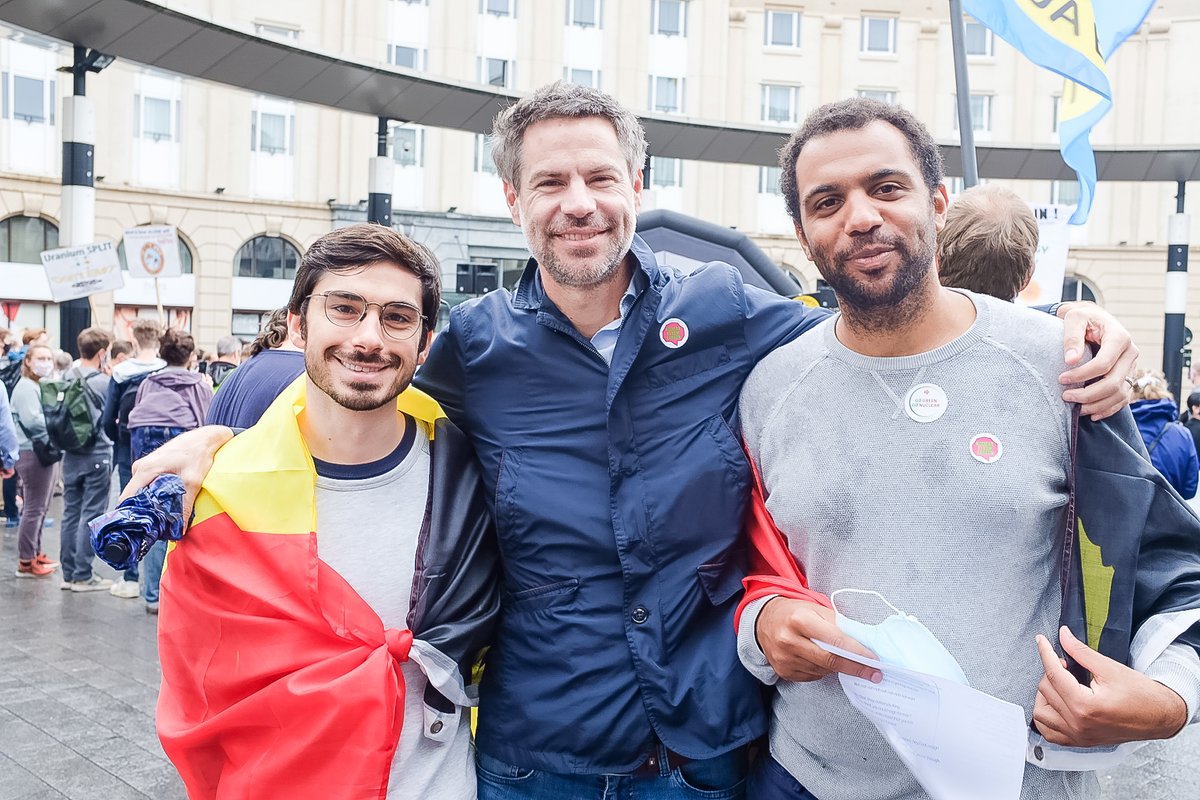
A lot of people said we were transitioning to renewables but as energy prices have spiked, and renewables have faltered, nations including France, Britain, & Japan are returning to nuclear
It's true that cowardice is common but courage is contagious
michaelshellenberger.substack.com/p/nations-go-n…
It's true that cowardice is common but courage is contagious
michaelshellenberger.substack.com/p/nations-go-n…
National leaders around the world are announcing big plans to return to nuclear energy now that the cost of natural gas, coal, and petroleum are spiking, and weather-dependent renewables are failing to deliver.
“The number one objective is to have innovative small-scale nuclear reactors in France by 2030 along with better waste management,” said French President Emmanuel Macron.
ft.com/content/d06500…
ft.com/content/d06500…
Macron had previously promised to reduce nuclear from 75 to 50 percent of its power, noted Financial Times. “But the mood has now changed,” the paper writes today. “Macron said on Tuesday he would begin investing in new nuclear projects ‘very quickly.’”
“Nuclear is coming [back] to the fulcrum of the energy debate in France and much faster than I ever thought it would,” said a partner at Lavoisier Conseil, an energy-focused management consultancy.
Meanwhile, the British government is in talks with Westinghouse over whether to build a new nuclear plant in Wales, one which could provide power for over six million homes, and has pushed China out of having a stake in a different nuclear plant, Sizewell
reuters.com/world/uk/uk-ta…
reuters.com/world/uk/uk-ta…
Last year, former Extinction Rebellion spokesperson @ziontree Lights, led a successful push to build Sizewell.
bbc.com/news/uk-541031…
bbc.com/news/uk-541031…
What explains the change? Rising energy prices and growing popular and political support for nuclear. Public support for nuclear energy rose 17 percentage points in France.
“I do not want our country to lose its energy sovereignty under the pretext of an absurd energy transition copied from Germany,” said a conservative French presidential candidate seeking to defeat Macron.
ft.com/content/d06500…
ft.com/content/d06500…
Finland has joined France, Poland, Hungary, the Czech Republic in lobbying the European Union to categorize nuclear power as sustainable. According to the Finnish Broadcasting Company, Finland’s pro-nuclear lobbying marks a U-turn within the Green Party.
euractiv.com/section/politi…
euractiv.com/section/politi…
“Traditionally the Green party has been fiercely anti-nuclear,” notes @EURACTIV “and has resigned from previous governments over the issue. Its views have become more pragmatic, and the Greens now claim to have a technology-neutral attitude when it comes to climate change.”
Growing reliance on renewables has made energy supplies vulnerable to gas shortages. Dependence on renewables has meant dependence on gas and its inevitable price spikes. Many nations are now returning to the dirtiest forms of electricity production, diesel and coal.
Yesterday, Japan's new prime minister defended his pro-nuclear policies. He came to power on a pro-nuclear platform. He defeated a former vaccine minister who had criticized nuclear energy. "It's crucial that we re-start nuclear power plants"
reuters.com/world/asia-pac…
reuters.com/world/asia-pac…
In South Korea, a growing majority of the public supports a return to nuclear energy, creating an opening for pro-nuclear presidential candidates.
koreatimes.co.kr/www/nation/202…
koreatimes.co.kr/www/nation/202…
“Mounting opposition to the government's nuclear phase-out policy has prompted presidential contenders from the opposition to promise to restore nuclear energy, highlighting the fact that it is the cheapest and cleanest alternative to imported fossil fuels."
An opposition leader became a presidential contender after he discovered that the current government had manipulated evidence to show nuclear was less cost-effective than it really is, in order to close a nuclear plant. “The controversy led Choe to vie for the presidency."
All of these events have come as a shock even to pro-nuclear people. In 2015, pro-nuclear environmentalists Mark Lynas and George Monbiot called on the British government to cancel plans to build nuclear plants, claiming they were too expensive.
theguardian.com/environment/20…
theguardian.com/environment/20…
One year later, I co-hosted a meeting in London of a handful of pro-nuclear activists from across Europe. The overwhelming consensus was that we should focus on lobbying EU politicians in Brussels, not try to build a grassroots movement, least of all in Germany.
A small group of us ignored the consensus and built a grassroots movement. Last month, hundreds of people around the world held "Stand Up for Nuclear" protests. One of the largest pro-nuclear cells in Europe is in Germany.
https://twitter.com/ShellenbergerMD/status/1436680620621639684?s=20
In Belgium I recorded a Facebook Live video with a charismatic pro-nuclear Member of the European Parliament, @Assita_Kanko , who rightly fears that Europe will become overly dependent on imported natural gas if Belgium, Germany, and France continue to shut down nuclear plants. 

A few weeks earlier, I accompanied an Australian TV crew from SkyNews as we took a boat ride to view the Diablo Canyon power plant in California, which Governor Gavin Newsom wants to close
https://twitter.com/ShellenbergerMD/status/1433131343815208962?s=20
Pro-nuclear forces are now mobilizing in Germany, which is set to shut down its last six reactors by the end of next year, and Netherlands, which is considering building new reactors.
Former Senior Analyst for Environmental Progress, Mark Nelson, is organizing major pro-nuclear protests in Amsterdam on November 6 and in Berlin on November 13.
https://twitter.com/energybants/status/1447566533119598597?s=20
Many within the nuclear industry and even the pro-nuclear movement are promoting small nuclear reactors because public opinion polling shows that liberals and progressives are more comfortable with such technologies.
The problem is that the technology only exists as an idea, not in the real world. And small reactors are invariably more expensive than large ones because they produce less electricity without significantly lower costs.
forbes.com/sites/michaels…
forbes.com/sites/michaels…
There is no technical fix to the stigma that has hung over nuclear energy since its creators, including Robert Oppenheimer, condemned it, out of guilt for having created the bomb, and the political Left in the Western World turned against it.
Public opinion must be won back the hard way, through building a pro-nuclear movement, testifying before governments, and publishing cutting-edge analyses, which have been the focus of Environmental Progress for nearly six years.
environmentalprogress.org/mission
environmentalprogress.org/mission
The victories the pro-nuclear movement is achieving are proof of our original vision. All of the main problems facing nuclear power result from the public's ignorance, which stems from the decades-long war against it.
This is the message I have carried to France, South Korea, Japan, Germany, Britain, and other nations around the world since 2016, when I founded Environmental Progress. And this is the subject of my next book, The War on Nuclear: Why It Hurts Us All (Carus 2022).
The good news is that courage is contagious.
Amidst America’s toxic cancel culture, former New York Times columnist turned Substack superstar, @bariweiss has been hosting a vital conversation about the need for courage.
bariweiss.substack.com/p/liquid-coura…
Amidst America’s toxic cancel culture, former New York Times columnist turned Substack superstar, @bariweiss has been hosting a vital conversation about the need for courage.
bariweiss.substack.com/p/liquid-coura…
Nowhere has courage been more necessary than in the fight for nuclear energy. What’s been behind the failure of nuclear energy since the sixties has been the unwillingness of its supporters to stand up for it. Happily, that is rapidly changing.
/END
/END

• • •
Missing some Tweet in this thread? You can try to
force a refresh






